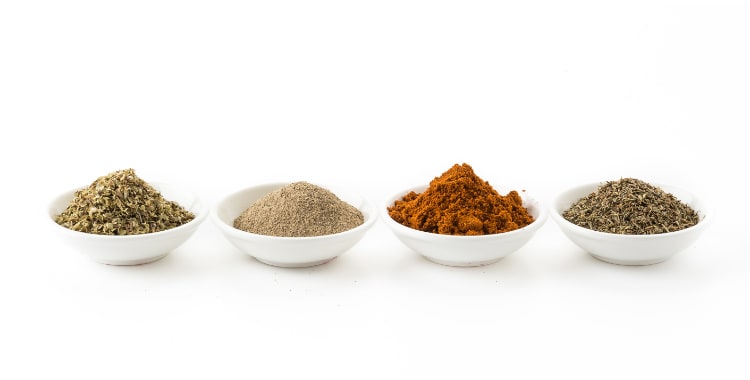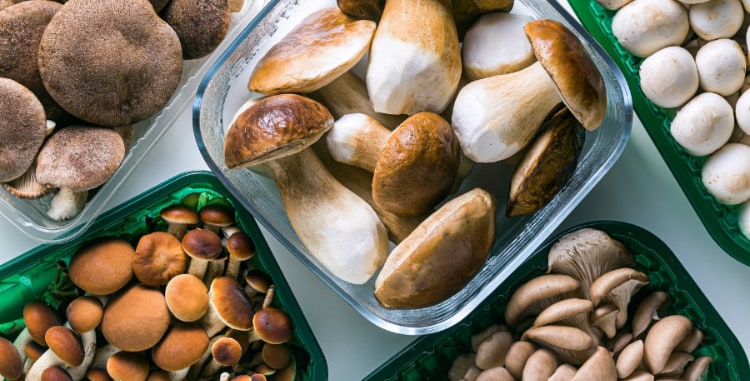
“Let food be thy medicine and medicine be thy food.”
As a certified nutritional therapist, I strongly identify with the quote from the ancient Greek physician, Hippocrates.
With the exception of a rare cheat meal, every single bite of food—and drink—you consume should support your health.
That’s why the first thing I do every morning after drinking a glass of water and waiting half an hour or so is drinking 16 oz of Organic Green Drink. The 7 leafy greens flood my trillions of cells with pure phytonutrients.
But when it’s time to get cooking in the kitchen, not only am I preparing low-starch veggies and lean proteins, I’m also sprinkling in an extra dose of medicine: herbs.
Herbs are so much more than flavor enhancers. For thousands of years in the Far East, medicinal herbs have been used topically to treat skin conditions, fevers and dozens of other symptoms. Medicinal herbs have also been used as food, not just to enhance taste but also to keep the body in balance, or help it get back to balance if you’re sick or feeling tired.
There’s a good chance you’re already using some medicinal herbs in your own kitchen. Here are some of the most popular herbs that are also used in traditional herbal medicine in China and other countries in the Orient. Start cooking with them daily and notice if you feel the difference!

Ginger
Every home chef uses ginger from time to time. But research studies show that it’s one traditional medicinal herb that’s worth using a lot more often than not.
When I was a kid and had a tummy ache, my mom would give me ginger ale. Even with all the sugar in the soda, the ginger compounds would get rid of my nausea or cramping instantly. I’m sure you can relate.
Over 100 compounds have been isolated from ginger. Studies (like this one) show that ginger functions as an antioxidant, antimicrobial and prevents inflammation in the brain. And ladies, if your monthly cycle is painful, get slicing on the fresh, raw ginger. (You may even want to consider also taking a ginger supplement.)
If you tend to run cold, even if it’s not a frigid winter day, cooking with ginger can instantly warm you up. Ginger also fortifies your immune system. If you tend to catch colds easily in the winter then you should definitely add ginger to your stir fries.

Turmeric
I believe this yellow-ish spice is just as valuable as gold, if not more so because, well, if you eat edible gold, you can’t absorb it. But turmeric on the other hand is one of the most powerful anti-inflammatory medicinal herbs. With the exception of ginger, turmeric has probably been the focus of the most research of any medicinal herb.
If you’ve ever had a curry dish, you’ve tasted turmeric. I know it might not sound appetizing and probably sacrilegious to Italian foodies and chefs, but I’m so down with turmeric I even add it to pasta dishes.
I admit that turmeric has an acquired taste; peppery, earthy, slightly bitter. But once you get used to it, you’ll learn to really appreciate its bold flavor. For at least 2,000 years, turmeric has been used as a medicinal herb in Southeast Asia. In traditional Chinese medicine, turmeric is thought to unblock blood stasis and move the Qi. Translation: it improves blood circulation, which leads to feeling more energetic.

Mushrooms
Wait, mushrooms are herbs? I thought they were a fungus?
If that’s what you’re thinking, you’re not wrong. But according to herbalism, edible ‘shrooms are considered herbs precisely because they have medicinal value.
Mushrooms are having a magical moment in the West after being relegated to a bland, squishy pizza topping for the most part for so long. These days, mushrooms are added to coffee blends, adaptogenic herbal energy drinks and more.
And this is a good thing. That’s because mushrooms help support a balanced immune system.
Like all produce, the best mushrooms to purchase are organically-grown varieties that you can get at your local farmer’s market or CSA (community-supported-agriculture).
In traditional Chinese medicine, mushrooms like reishi—the king of all mushrooms in China—are added to soups and tea, and are used to treat coughing and wheezing.
Lately, I’ve been so impressed by how far edible mushrooms have come. I have sunk my teeth into a vegan mushroom burrito that I swear had the consistency and taste of steak!

Cinnamon
Another common medicinal herb that you’re probably already using is cinnamon, but most likely, you’re only adding this spice to coffee, tea, yogurt or waffles. (Both spices and herbs come from plants; spices are derived from roots.)
Try adding cinnamon twigs to other dishes from now on. Similar to ginger, cinnamon has warming properties. So if you’re constantly running cold, adding a cinnamon twig to your dishes can fire up your furnace.
Managing blood sugar levels is one of the biggest benefits of consuming cinnamon on a regular basis. If you gotta have some honey or maple syrup with your yogurt, then definitely sprinkle a bunch of cinnamon to slow down the blood sugar spike.
But try to also add cinnamon twigs to stir fry dishes, salad dressings, low-carb baked treats, and more.

Mint
I’ve included a couple Yang-fortifying herbs above: ginger and turmeric. Mint is a Yin-fortifying herb, which helps cool the body down. If you’re sweating over the stove in the summer, add plenty of mint to your food or drinks. Mint helps clear the body of excess symptoms associated with heat imbalances, according to Chinese medicine. So if you have a fever, rash, sore throat, or cough drink plenty of peppermint tea and add sprigs of mint to your dishes.
Mmmm. I’m getting hungry. I wish I could come over and help you get cooking with these medicinal herbs!
To your health.
Chef V













